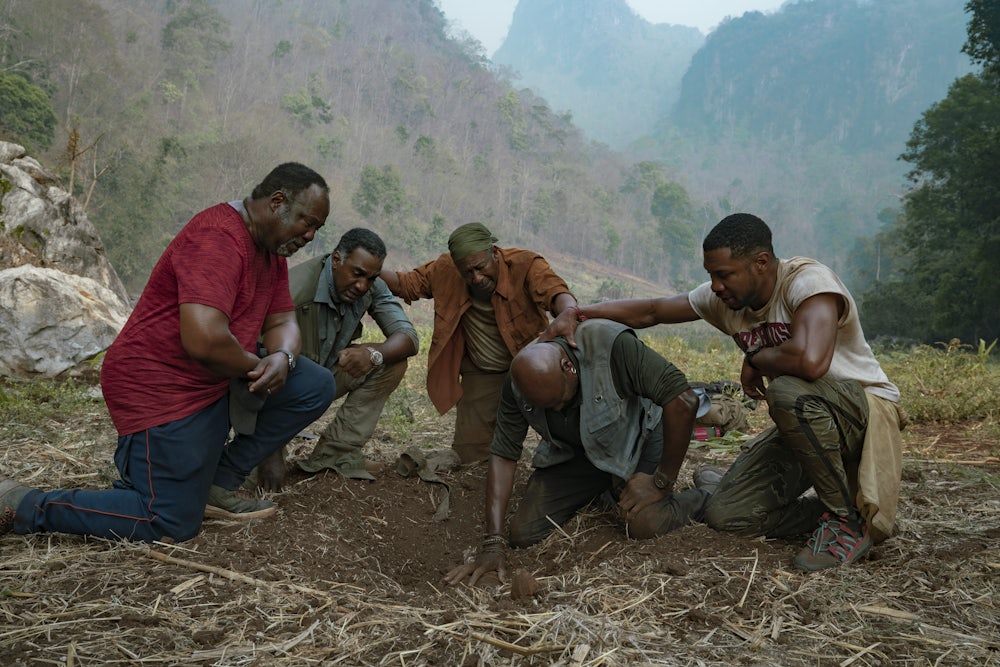In the final shot of the 1989 civil war movie Glory, the corpse of Private Trip (Denzel Washington) rolls down a sand dune and comes to a stop under the armpit of his equally dead commander, Colonel Shaw (Matthew Broderick). A historical piece about one of America’s first units of black soldiers, Glory is an illustration of the difficulty facing directors who want to make fiction out of war: No matter how good the characters, death is always going to end up in the starring role.
The latest addition to the small but distinguished genre of films about America’s black military history is Da 5 Bloods by Spike Lee, which starts streaming today on Netflix. Four old platoon-mates meet up on vacation in modern-day Vietnam, where they fought together, decades earlier. Paul (Delroy Lindo), Eddie (Norm Lewis), Mel (Isiah Whitlock Jr.), and Otis (Clarke Peters) are still alive, but their beloved leader, Stormin’ Norman (Chadwick Boseman)—“Our Malcolm and our Martin,” Otis calls him—died in Paul’s arms in the war. Now, joined by Paul’s son David (the charming Jonathan Majors), the four survivors set out into the Vietnamese jungle once more, to recover their lost comrade’s body and something else—something valuable—they left behind.
Da 5 Bloods is well over two hours long and veers between cinematic styles in ways both joyful and bewildering. Historical footage (both real and fictional) is spliced with glossy contemporary scenes, and the first hour builds a solid portrait of the titular blood brothers’ bond, which was only strengthened by the grief of losing their commander. The late Stormin’ Norman, we learn, talked often about black history. He also taught the bloods to build solidarity with each other through love of man and faith in God, which in turn enabled them to discover their true selves as individuals.
Fighting for a country that does not treat you as a full citizen means living inside a contradiction. Da 5 Bloods suggests that this contradiction has two chief effects: First, it has forced the bloods to learn what is and isn’t worth dying for; and second, it begets the kind of intergenerational trauma that has no statute of limitations. Beneath the layer of blood and the ever-present threat of death, Da 5 Bloods is a study in intimate masculine relationships, specifically black ones, and the way those bonds are exploited in the name of war.
It’s not much of a spoiler to say that when they enter the jungle, the bond begins to fray, and the movie’s sparkly performances (Clarke Peters and Isiah Whitlock Jr. are especially hilarious) get edged out by shotgun fire, land mines, and action scenes. While the other actors take a backseat, Delroy Lindo comes to the fore as Paul, a MAGA-hat-wearing veteran whose PTSD is triggered by the expedition. His character is hypnotic and riven with contradictions, espousing both black power and Donald Trump, while hurling ethnic slurs at the Vietnamese with abandon.
Paul’s Lear-like antisocial behavior slices through otherwise comic scenes, in a tense interplay of styles whose subtlety makes the gunfire look boring. When he really loses the plot, Paul grows paranoid of his friends and begins to hallucinate, then walks into the jungle alone, thundering in rich tones at God about “thy rod! And thy staff!” Lindo acts a burning streak through Da 5 Bloods, his mere glances (a guilty, millisecond-long look at his son, before abandoning him) forming the movie’s most unforgettable moments.
When Paul breaks down, the violence that had previously been contained to flashback scenes of the war (in which all the actors appear as their own ages, gray beards and all, which proves less distracting than youth-enhancing makeup) spills out into the present day. There are severed limbs and arcing jets of blood. Aside from some glorious scenes set to Marvin Gaye, the action is mostly accompanied by a musical score of gloopy, sentimental strings reminiscent of the Jurassic Park soundtrack.
Is Lee turning death into a hokey spectacle on purpose? Making the violence explicit seems to be meaningful for Lee, but the film loses its direction amid all the gore and exploding flesh.
Lee also repeats a device in Da 5 Bloods that he used in The Miracle of St. Anna, his 2008 film about black soldiers in occupied Italy during World War II, which also juxtaposed bloody violence against intense male friendship. In that film, a sexy German woman’s voice spoke to the troops through loudspeakers as they crept towards the battlefront, telling them that it was absurd to fight for a racist country that wouldn’t fight for them. This time, it’s Hanoi Hannah doing the same thing, and it occasions the same outraged resistance among our sharpshooting young soldiers. Although both things probably happened, and it makes for two effective scenes, why do it twice? There are other repetitions that suggest Lee is either being excessively self-referential or is mining his old movies for material.
Da 5 Bloods is an emotionally exhausting movie, because its lead characters are in endless conflict with themselves, one another, and the past. Lee also seems to be in conflict with himself in this movie, as if yanked between comedy and tragedy and unsure which way to go. The result is a maximalist and colorful film, full of plot twists and sudden reversals, swamping the viewer in a sense of chaos well matched to the madness of the Vietnam War.
In the middle of it all, Delroy Lindo glows like an ember about to start a fire, his face a constant reminder that it can be harder to survive a war than not to make it out. In a film about mass extermination, nobody can out-act death—but Lindo comes much, much closer than most.
